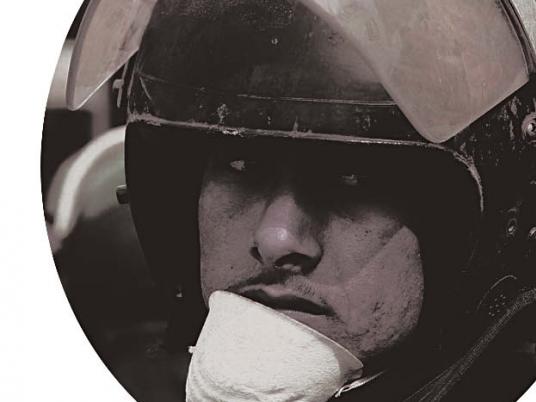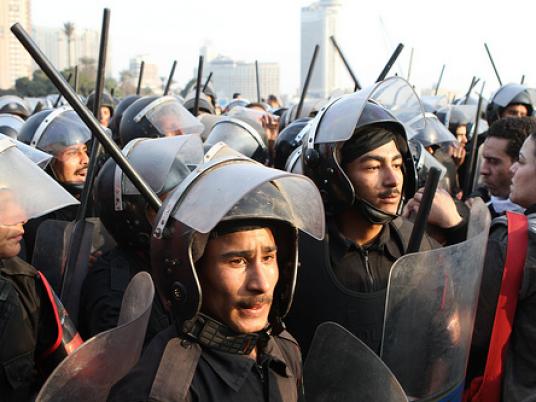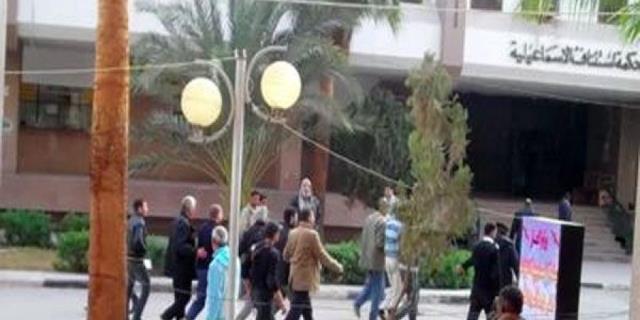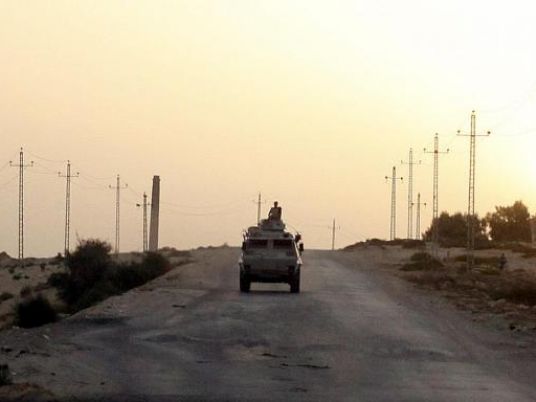
An Egyptian is lying naked on the ground while policemen are kicking him. Another is lying dead in a hospital with traces of torture on his body three days after he was kidnapped by security forces. Dozens of others are killed in clashes with the police throughout last week’s wave of violence.
This is January 2013. Two years have passed since the 25 January revolution, which primarily set out to overturn widely seen violations by the police apparatus. On the commemoration of this historic event, the police practices that produced so much wrath are seen reproduced.
But, two years following the revolution, Egypt Independent has found out, the security apparatus is not as confident in its practices as before.
In Suez, soldiers in the Central Security Forces (CSF) withdrew following violent clashes that started with the commemoration of the revolution on 25 January, according to one CSF officer Egypt Independent contacted. In neighboring Port Said, two policemen were killed in the clashes that erupted in the wake of a verdict sentencing to death 21 young people accused in the killing of at least 72 football fans from a rival Cairo club at a game last February.
Near the presidential palace and in Tahrir Square, also the site of raging violence in recent days, policemen on the front line have been severely injured.
Osama, a CSF recruit in Suez, said that by the evening of 25 January this year, attacks on police headquarters had reached a peak, which led some soldiers to hand over their weapons and flee for their lives.
This type of withdrawal is not the first of its kind after President Mohamed Morsy took power. In early November, media reports circulated about the withdrawal of security officers from Arish in North Sinai, who feared the wrath of protesters following the murder of a young man at a checkpoint after a scuffle with a policeman.
“Some police officers encouraged us to go, saying they did not want to clash with protesters, and others cried when they found out that we were [withdrawing]. They told us we had to stay and protect police stations,” Osama said about the Suez attack.
Protecting the regime
“I went back home because there would be nobody to protect me there. Also, I did not want to beat people. Why beat people? I do not want to protect the Brothers,” Osama said.
Osama is not the only soldier who is unsettled by the role the police are playing under the current regime. A CSF officer in the Delta city of Kafr al-Sheikh, who preferred to be referred to as Islam, said most of his colleagues resent the current situation.
“We do not want to protect the regime anymore, we do not want to be in confrontation with people, and we do not want to be part of the political game again. But we are forced to do so,” Islam said.
“Nothing is in our hands,” he added. “I swear, we are the ones screwed.”
Islam stressed that he was assaulted, his weapon was stolen and he lost consciousness during an attack on the Muslim Brotherhood’s Freedom and Justice Party headquarters following the 22 November constitutional declaration, through which Morsy claimed additional powers, causing a wave of street fury against him. He said the Interior Ministry disciplined him by deducting seven days of his monthly salary and forcing him to pay for the stolen weapon.
“I did not want to protect the FJP headquarters or protect the regime but our leaders are putting us in confrontation with the people,” Islam said.
Others also described similar pressure from leadership.
Mohamed Mahfouz, former colonel and assistant coordinator of a coalition of officers dubbed “Officers but Honorable,” accused the police leadership of surrendering to the regime out of fear for their posts and the financial benefits they reap through it.
He said leaders are ready to serve any regime, as long as they maintain their positions and secure a source of wealth.
“A large segment of Interior Ministry officers learned the lessons of the January revolution and realized that leaders would be protected by the regime, while they would be leading confrontations in the street,” Mahfouz said. “A minority of officers, though, are ready to carry out any orders.”
Another security officer, who preferred to be referred to as Eissa, agreed with what Mahfouz said about the majority of police officers not wanting to protect the regime.
Meanwhile, some officers do not care who is in power, whether it is the Brotherhood or others — especially junior officers who just want to prove themselves efficient by suppressing people in the street, Eissa said, referring to a prevalent culture within the apparatus.
Shifting away from politics
But the security apparatus experienced a shift away from politics following the revolution.
Karim Ennarah, a researcher focusing on policing and criminal justice at the Egyptian Initiative for Personal Rights, an independent rights group, said it was clear that the Interior Minister under former Minister Ahmed Gamal Eddin wanted to pull out of the political arena.
“We all saw how security forces dealt with protesters when they surrounded the Ettehadiya Presidential Palace in large numbers and how they withdrew to avoid clashes,” Ennarah said.
On 4 December, a large number of opponents to Morsy gathered at the presidential palace to protest his constitutional declaration. Security forces clashed with them briefly before withdrawing. Demonstrations continued peacefully in front of the palace.
The Brotherhood then sent a number of its members the next day to protect the palace, claiming it was under threat of invasion from Morsy’s opposition. The day ended with bloody clashes between the two groups, leading to 11 deaths and many injuries.
Gamal Eddin was dismissed in a recent Cabinet reshuffle, and Major General Mohamed Ibrahim replaced him. Ennarah and others opined that Gamal Eddin was dismissed because he attempted to keep the Interior Ministry away from politics.
The situation now is different.
“Former minister Gamal Eddin was trying to pull the police out of the political scene, but the current minister is biased toward the Muslim Brotherhood. He gets us in trouble,” Islam said.
However, discontent is brewing over the politicization of the ministry’s work.
Interior Ministry spokesperson Hany Abdel Latif told Egypt Independent that the ministry and police officers are paying the price for political conflicts. Interior ministers have been changed several times in the last two years, because they are the only ministers who must face challenges on the ground, although solutions lie with political leaders and not within the security apparatus, he said.
But Mahfouz believes that what is happening now is “malicious behavior on the part of the Brothers.”
The Muslim Brotherhood wants to pressure the police to confront people until people hate them; the police have no other refuge but the regime, Mahfouz said, adding that the police will thus return to the regime and turn against the people again.
“The Brothers want an oppressive security apparatus and that’s why the current apparatus is ideal for them. It will help them reshape Egyptian society according to their ideology, which aims at Islamizing society, and which will lead to resistance that has to be quelled through the Interior Ministry,” Mahfouz added.
Giving up on reform
Accordingly, for Mahfouz, there is no intention from the Brothers to restructure the Interior Ministry. On the contrary, Morsy has recently expressed gratitude for its performance.
Mahfouz said that, following the revolution, officers were more ready for change, and if there had been a real plan for restructuring the ministry, it would have materialized. Such a plan would have been conducive to a strong security apparatus capable of protecting citizens and respecting human rights, he said.
“[Both] the Supreme Council of the Armed Forces, followed by the Muslim Brotherhood, [had] no genuine political will to restructure the Interior Ministry, and this has led to our return to square one,” said Mahfouz. “Officers can’t swim against the wave, and the prevalent wave is against restructuring the ministry.”
Ennarah agreed, noting that the regime could resort to simple solutions at least on the short term to restructure the apparatus. Other long-term solutions are also pursuable, he said.
“Withdrawal can be a tactical solution. There also has to be a revisiting of the ministry’s armament when it comes to protests, at least in the short term,” Ennarah said.
Ennarah also said the law pertaining to use of force against civilians should be revisited.
“There should be a real gradual use of force according to the law, in addition to the need for real supervision over the ministry’s practices through independent institutions,” Ennarah said. “There has to be real accountability when violations are committed.”
Ennarah said the ministry’s denial of the use of live bullets and birdshot is completely without basis, since every security force formed to confront a protest is usually armed with automatic guns, in addition to birdshot, which is usually carried by officers stationed behind the soldiers who carry the tear gas guns.
But Abdel Latif denied this account.
“There is no live ammunition or birdshot. There is only tear gas. The proof is when a gang tried to attack a group of peaceful protesters in Ettehadiya and hit them with birdshot,” said Abdel Latif.
He said a lieutenant got hurt and lost his right eye, and that security forces didn’t have birdshot. In a second incident, a general was attacked and two armored vehicles were stolen last week near Tahrir Square, while not one protester was killed, Abdel Latif said.
Another example is the angry soldiers who erupted at the minister during one of his visits to a hospital, when they told him they didn’t have enough arms and were being fired at with live ammunition.
Breaking orders
For Eissa, the revolution increased defiance within the ministry.
“After the revolution, commitment [to] the ministry has been diminishing, and it has become very hard to control soldiers. Senior policemen now prefer to avoid the soldiers or giving them orders because there would be resistance, such as the soldier breaking orders,” Eissa said. “This is happening despite the fact that the ministry has been trying to please them by adding to their salaries and giving them bonuses.”
Eissa added that such incidents are anomalies, given the fact that officers usually show allegiance to keep their record empty of penalties, which is critical to get them promoted. Senior officers usually use this weakness to get them to follow orders.
Mahfouz argued that officers live in an isolated bubble from society, which they perceive through the lens of their profession. Sometimes, they see themselves as the victims of violence in which they are implicated, since they can’t break the orders, while the street is angry.
Islam and Eissa’s accounts corroborate this claim.
“We would like to do the real job of a security officer: to protect the people, arrest suspects, preserve security on the street and around banks, and so on,” said Islam. “I don’t want our role to only be about protecting public institutions, which are owned by all Egyptians.”
And if security forces must protect public institutions, he said, “the beating of protesters can’t be that random.”
“We need to understand when to fire tear gas and how to fire it,” said Islam.
He said the fact that there is no union through which policemen can meet and talk represents a challenge, one that circumvents their ability to make informed and unified choices about appointments or decisions.
If a soldier refuses to follow the orders, he said, he will be investigated and penalized, even possibly facing a military trial.
For Eissa, the responsibility lies on the shoulders of the regime, because it puts the police at the forefront of confrontation, creating a situation in which “if you don’t hit the protesters, you will be hit.” This fuels violence on both sides, he said.
“We are standing between people and the regime. People are against us and the regime doesn’t protect us. And we are still expected to do our jobs,” said Islam.
This piece was originally published in Egypt Independent's weekly print edition.




